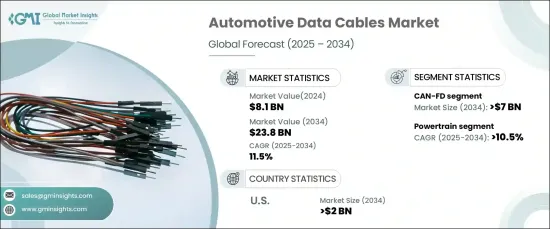
세계의 자동차용 데이터 케이블 시장은 2024년에 81억 달러로 평가되었고, 2025년부터 2034년에 걸쳐 CAGR 11.5%로 급성장할 전망입니다.
이러한 수요의 급증은 최신 자동차로의 고급 전자 시스템의 통합이 진행되고 있는 것 외에 자동차 분야에서의 안전 기준과 규제가 엄격해지고 있는 것이 배경에 있습니다. 이러한 기술적 진보로 자동차의 효율적인 데이터 전송과 연결성에 대한 요구가 커지고 있습니다. 자동차 업계에서는 센서, 카메라, 인포테인먼트 시스템 등 전자 부품에 대한 의존도가 높아지고 있으며, 이는 고품질의 자동차용 데이터 케이블 수요에 크게 기여하고 있습니다. 게다가 정부의 지원방안에 뒷받침되는 차차간(V2V) 및 차차간 인프라(V2I) 기술의 확대는 전자 시스템의 개발과 채용을 가속화하고 시장을 더욱 밀어 올리고 있습니다.

특히 스마트시티와 커넥티드 트랜스포테이션에 초점을 맞춘 인프라 정비가 진행됨에 따라 자동차용 데이터 케이블 수요가 증가하고 있습니다. 이 성장은 주요 제조업체들이 세계적으로 생산 시설을 확장하고 있다는 점을 더욱 뒷받침하고 있습니다. 주요 기업은 생산 공정을 최적화하고 리드 타임을 단축함으로써 각 지역의 선호와 규제 기준을 충족하는 자동차에 대한 수요 증가에 대응할 수 있게 되었습니다. 이러한 노력은 업계 공급망을 강화할 뿐만 아니라 전자 부품의 기술 혁신을 촉진하고 자동차 부문의 데이터 케이블 수요를 끌어올리고 있습니다.
| 시장 범위 | |
|---|---|
| 시작 연도 | 2024년 |
| 예측 연도 | 2025-2034년 |
| 시작 금액 | 81억 달러 |
| 예측 금액 | 238억 달러 |
| CAGR | 11.5% |
CAN-FD(컨트롤러 영역 네트워크 유연 데이터 전송률) 부문은 2034년까지 70억 달러의 매출이 예상됩니다. CAN-FD 기술은 빠르고 효율적인 데이터 전송을 가능하게 하는 것으로 알려져 있으며, 시스템 간의 고속 통신이 필요한 현대 자동차에 필수적입니다. 자동차 제조업체는 CAN-FD 기술의 강화에 엄청난 투자를 하고 있으며, 자동차 및 산업 분야에서 복잡해지는 용도을 지원합니다. 이러한 CAN-FD 솔루션의 지속적인 개발은 최적의 성능을 얻기 위해 더 빠르고 안정적인 데이터 전송이 필요한 최신 자동차의 요구를 충족시키는 데 필수적입니다.
게다가 파워트레인 분야는 큰 성장을 이루었고, 2034년까지의 CAGR은 10.5%로 예측되고 있습니다. 이 성장에는 전기자동차(EV)로의 이동이 큰 역할을 합니다. 자동차 제조업체가 최신 파워트레인의 고급 데이터 요구 사항을 충족하기 위해 고급 전자 및 온보드 컴퓨터 네트워크를 채택함에 따라이 분야의 자동차용 데이터 케이블 요구가 계속 증가하고 있습니다. 파워트레인 시스템의 복잡성은 최첨단 전기 기술의 통합과 함께 차량 기능의 원활한 데이터 교환을 가능하게 하고 차량 전체의 성능과 효율성을 지원하는 견고한 데이터 케이블 기회를 제시합니다.
미국의 자동차용 데이터 케이블 시장은 2034년까지 20억 달러에 이를 것으로 예측됩니다. 소비자의 관심과 환경에 대한 배려로 인해 전기자동차로의 급속한 전환이 진행되고 있으며, 자동차용 데이터 케이블을 포함한 고급 전자 부품 수요가 크게 증가하고 있습니다. 미국 상대방 상표 제품 제조 회사(OEM)는 더 많은 전자 시스템을 통합하기 위해 차량 설계의 진보에 주력하고 있으며 데이터 케이블에 대한 수요가 급증하고 있습니다. 이 동향은 파워트레인 기술에 고도의 일렉트로닉스를 통합하고 종래의 기계 시스템을 전자 제어로 대체함으로써 자동차의 효율과 성능을 높이는 것으로 더욱 박차가 걸리고 있습니다.
The Global Automotive Data Cables Market, valued at USD 8.1 billion in 2024, is expected to grow rapidly at a CAGR of 11.5% between 2025 and 2034. This surge in demand is driven by the increasing integration of advanced electronic systems into modern vehicles, coupled with the implementation of stricter safety standards and regulations within the automotive sector. These technological advancements have led to the rising need for efficient data transfer and connectivity in vehicles. The automotive industry's growing reliance on electronic components, including sensors, cameras, and infotainment systems, has significantly contributed to the demand for high-quality automotive data cables. Moreover, the expansion of vehicle-to-vehicle (V2V) and vehicle-to-infrastructure (V2I) technologies, backed by supportive government initiatives, is accelerating the development and adoption of electronic systems, further pushing the market forward.

As infrastructure continues to improve, especially with the focus on smart cities and connected transportation, the demand for automotive data cables is intensifying. This growth is further supported by key manufacturers expanding their production facilities globally. By optimizing production processes and reducing lead times, companies are better able to cater to the growing regional demand for vehicles that meet local preferences and regulatory standards. These efforts are not only strengthening the industry's supply chain but also fostering innovation in electronic components, boosting the demand for data cables in the automotive sector.
| Market Scope | |
|---|---|
| Start Year | 2024 |
| Forecast Year | 2025-2034 |
| Start Value | $8.1 Billion |
| Forecast Value | $23.8 Billion |
| CAGR | 11.5% |
The CAN-FD (Controller Area Network Flexible Data-rate) segment is expected to generate USD 7 billion in revenue by 2034. CAN-FD technology, known for its ability to facilitate rapid and efficient data transfer, has become essential for modern vehicles that require high-speed communication between systems. Automotive manufacturers are investing significantly in the enhancement of CAN-FD technology to support increasingly complex applications within both automotive and industrial sectors. This ongoing development of CAN-FD solutions is critical to meeting the demands of modern vehicles, which require faster, more reliable data transmission for optimal performance.
Additionally, the powertrain segment is set to experience significant growth, with a projected CAGR of 10.5% through 2034. The shift towards electric vehicles (EVs) is playing a major role in this growth. As automotive manufacturers adopt advanced electronics and onboard computer networks to meet the high data requirements of modern powertrains, the need for automotive data cables in this sector continues to rise. The increasing complexity of powertrain systems, coupled with the integration of cutting-edge electric technologies, presents an opportunity for robust data cables to enable seamless data exchange for vehicle functions, supporting overall vehicle performance and efficiency.
The U.S. automotive data cables market is projected to reach USD 2 billion by 2034. The rapid transition toward electric vehicles, driven by growing consumer interest and environmental considerations, has significantly increased the demand for sophisticated electronic components, including automotive data cables. Original equipment manufacturers (OEMs) in the U.S. are focused on advancing vehicle designs to incorporate more electronic systems, creating a surge in demand for data cables. This trend is further fueled by the integration of advanced electronics in powertrain technologies, replacing traditional mechanical systems with electronic controls, thus enhancing vehicle efficiency and performance.